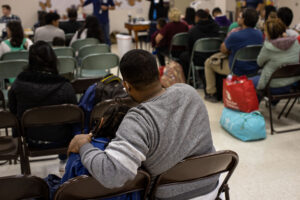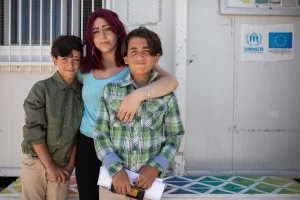On Sunday’s episode of The Excerpt podcast: Early-onset cancer is now considered a global health crisis. While rates of gastrointestinal cancer in populations 65 and older are declining, colorectal cancer is now the leading cause of cancer deaths in men under the age of 50 and the second among women of the same age. The question is why? Dr. Kimmie Ng, founding director of the Young-Onset Colorectal Cancer Center at the Dana-Farber Cancer Institute, joins The Excerpt to explain how the medical and research community is tackling this troubling development.
Dana Taylor:
Hello and welcome to The Excerpt. I’m Dana Taylor. Today is Sunday, May 19th, 2024.
Early onset cancer is now considered a global health crisis. Scientists are perplexed at how perfectly healthy people under 50 in the prime of their lives are developing and dying of aggressive cancers at younger ages more quickly than ever. While rates of gastrointestinal cancer and populations 65 and older are declining, younger people are seeing the biggest rise as colorectal cancer is now the leading cause of cancer deaths in men under the age of 50 and second among women of the same age. To learn more about how the medical and research community is tackling this troubling development is Dr. Kimmie Ng, the founding director of the Young-Onset Colorectal Cancer Center and co-director of the Colon and Rectal Cancer Center at Dana-Farber. Thanks for joining us, Kimmie.
Dr. Kimmie Ng:
Thank you for having me.
Dana Taylor:
Since 1994, cases of young onset colorectal cancer have increased by 51% according to the National Cancer Institute. Why is cancer rising in younger people and why in this organ?
Dr. Kimmie Ng:
That is the million-dollar question that a lot of scientists and researchers are working to try and answer. So we know overall the silver lining is that colorectal cancer has been declining in incidence and mortality if you consider people of all ages. And that is largely due to successes of screening programs, better adherence to screening and also improved treatments. But this same benefit and improvement has not been seen in people under the age of 50. And we do think it’s probably an environmental exposure or risk factor or combination of such that is likely leading to the rise of this disease in younger people.
Dana Taylor:
Are there other types of cancer also seeing a huge increase in young people?
Dr. Kimmie Ng:
Yes, there are actually. Breast cancer for a while now has been rising in very young women. Things like ovarian cancer and endometrial cancer have also been rising. But really the cancers that have the highest rate of rise are actually cancers within the digestive system. So gastrointestinal tract cancers such as pancreatic cancer, appendix cancer, bile duct cancers have also all been rising significantly in people under the age of 50. And similarly to colorectal cancer, we don’t really understand yet what the underlying causes are.
Dana Taylor:
So why is a rising cancer among younger people puzzling scientists?
Dr. Kimmie Ng:
So a lot of times you think when a person comes to you young and otherwise healthy, that it must be a genetic condition or family history that is predisposing that person to developing this cancer at a very young age. However, that is not what we’re seeing in our clinics. Actually, these very, very young people are often very healthy. They’re very active, exercise a lot, follow healthy diets, and they don’t have a history of cancer in their family and they don’t have a background of a genetic syndrome. And so that’s what’s really puzzling and troubling to all of us. Why are these otherwise healthy young people in the prime of their lives developing cancer and often very advanced stages of cancer. And I think, again, this really is going to be pointing back to some environmental change that’s happened recently that is likely contributing to why this is happening.
Dana Taylor:
Can you tell us more about the profile of who this is impacting, if there are any disparities among communities or regions across the world?
Dr. Kimmie Ng:
Unfortunately, this is a global phenomenon. The rates of young onset colorectal cancer are rising in very many different parts of the world. Interestingly, the rates seem to be steepest and highest among higher socioeconomic status countries and those who may be characterized as having more of a westernized lifestyle. But even increases have been documented in Mediterranean countries for example, in sub-Saharan Africa, in East Asian countries where many times the diets and lifestyles are quite different than that in the U.S. So this is really a global phenomenon.
In terms of by race and ethnicity, we have known for years now that there are very striking and concerning disparities in the incidence and mortality of colorectal cancer by race and ethnicity, where individuals in the Black population are 20% more likely to be diagnosed with colorectal cancer and at a younger age when they’re diagnosed and 40% more likely to die. But interestingly, the rates of rise of young onset colorectal cancer are steepest in non-Hispanic whites such that some of those disparities are actually narrowing because of this stark increase among the white population. And when we talk about the United States, for every single state where we have data, there has been a documented rise in young onset colorectal cancer.
Dana Taylor:
Researchers are interested in the impact of something called the “birth cohort effect” on cancer rates. Can you explain what this is and how factors like the environment and lifestyle may be behind the surge?
Dr. Kimmie Ng:
That’s a great question, and I think this birth cohort effect that you just mentioned really gives us the strongest clue that perhaps it is some recent environmental change that is contributing to the rise in young onset colorectal cancer.
So what we mean by a birth cohort effect is that the rate of rise of colorectal cancer in young people is varying and traveling by generation. And so the statistics show that a person who was born in 1990 compared to a person of the same age who was born in 1949 now has quadrupled the risk of developing rectal cancer and over double the risk of developing colon cancer. And so when we see effects such as this birth cohort effect, it usually means that there’s some recent environmental exposure or change in our diets or lifestyles that happen been at a certain period of time and is now inducing or contributing to the risk that is now traveling with generations as these generations age. So that probably has provided the biggest clue that it’s probably something environmental and not genetic that is leading to this rate of rise.
Dana Taylor:
A study found that having been breastfed as an infant was associated with a 23% increased risk in colorectal cancer later in life. Should this discourage breastfeeding or there are other factors in biological considerations that should be taken into account?
Dr. Kimmie Ng:
Absolutely not. It should not discourage breastfeeding, which we know has so many protective and beneficial health consequences. So definitely this is not a study that should be interpreted to mean that you should not breastfeed your children. But this finding that we stumbled upon has actually been reported in other cohort studies as well. So the finding is consistent, but I do want to emphasize it’s not a cause and effect relationship that we see. It’s really right now just an association and we don’t understand very well at all what the underlying mechanism may be for why being breastfed as an infant may increase your risk of developing colorectal cancer later as an adult.
But when we did ask these young women in the nurses’ health study, which is a large cohort of healthy young female nurses who we’ve been following for decades, we did see that if they reported that they were breastfed as an infant, their risk of developing colorectal cancer in adulthood was about 23% higher. And the longer they were breastfed, the higher their risk was. And so it really was a consistent effect.
If you want to talk specifically about young people in developing colorectal cancer under the age of 50, we did see an association between women who reported that they were breastfed as an infant in developing polyps, including high risk polyps before they were age 50. And we know that these polyps are the precursor lesion to developing colorectal cancer later on. So that association was seen and does seem pretty consistent across different studies.
Dana Taylor:
By 2030, colon rectal cancer among Americans 20 to 34 years old is expected to increase by 90% with rectal cancer rates expected to increase by a staggering 124%. With young onset cancer typically discovered after the disease has advanced, should there be changes made to how early in life people get cancer screenings?
Dr. Kimmie Ng:
It’s a great question and I think a difficult one to answer. In direct response to these rising rates of colorectal cancer in young people, the United States Preventive Services Task Force did recently change their guidelines for screening average risk individuals to be lowered from age 50 down to 45. We do know that the vast majority of patients diagnosed with young onset colorectal cancer are in their 40s. So I think that change alone probably will lead to more cancer prevention as well as earlier detection of these cancers in young people at a stage when they are much more curable.
But when we look at the statistics, the rates of rise are actually steepest among people in their 20s and 30s. And even with this new guideline change, they still are not eligible for screening, and that is a concern. So I think efforts are underway to really try and investigate if there are better ways and cost-effective ways to deploy a screening method more broadly beyond ages of 45 and up, and whether there are novel ways that we can try and do this to detect these cancers earlier in young people. But I think the take-home message is that there is an urgency to doing the research here to understanding what are the risk factors underlying this rise, what are the causes? And if we understood that, then we can identify the young people who are at high risk and target them for earlier screening.
Dana Taylor:
How could the possibility of early onset cancer affect how younger adults lead their lives as they’re establishing their careers and families?
Dr. Kimmie Ng:
We know that no matter what age you are, being diagnosed with cancer is challenging. But young people face unique challenges related to the cancer and the treatment. We know that 80% of our patients with young onset colorectal cancer have children under the age of 18 when they’re diagnosed. Many also are just planning to start their families at the time they’re diagnosed. Many are also caring for elderly parents at the same time. This really truly is the sandwich generation of people that we’re talking about that are affected by this very serious disease. And as you mentioned, people are in the height of their careers or in the midst of their education when they get diagnosed.
And so there is a lot of psychosocial distress and financial toxicity that comes along with this diagnosis that is probably unique to these young people experiencing colorectal cancer. And the impact on fertility just cannot be overstated. Most of these cancers are rectal cancer in young people, and the treatment for rectal cancer often involves surgery. It often involves radiation down to the pelvis, which can all impact fertility. So it is of the utmost importance that care teams really talk to patients prior to starting treatment about possibilities of fertility preservation so that some of those goals that people have in their life are not eliminated because of this cancer diagnosis.
Dana Taylor:
Young onset disease is often more aggressive. What symptoms should people be looking out for?
Dr. Kimmie Ng:
Great question. It’s so important in terms of earlier detection and try not to delay diagnoses, which we know are so commonly found among these young people who often wait quite a long time, six months to over a year before being correctly diagnosed with colorectal cancer. So the most common symptom that young patients present with is actually seeing blood in their stool. The second most common is abdominal or pelvic discomfort and a sense of bloating. And other red flag symptoms may include a change in your bowel habits. So new diarrhea, new constipation, a change in the caliber of the stool, including thinner pencil thin stools, and then abdominal pain, unintentional weight loss and fatigue and shortness of breath that may happen with exertion that may indicate that anemia is present. Those are the most common symptoms that often lead to a diagnosis of colorectal cancer.
Dana Taylor:
Where is current research and what can we expect in the future to try and combat this growing and deadly issue?
Dr. Kimmie Ng:
So current research efforts, including ones undertaken by my group, are trying to look at known diet and lifestyle risk factors for colorectal cancer regardless of what age you are. We know colorectal cancer is one of the cancer types that is most strongly linked to environmental factors. And so we’ve been focusing on some of those risk factors that have also been skyrocketing in recent decades, paralleling the rise in young onset colorectal cancer, and probably the leading hypothesis has been obesity. There’s been a lot already talked about in terms of rates of obesity rising dramatically in adults as well as in children and adolescents. And there is a reported association between obesity and an increased risk of developing young onset colorectal cancer. But I have to say, most of the patients we’re seeing in clinic are not obese.
We’ve also looked at risk factors like sedentary behavior, drinking sugar sweetened beverages, low levels of vitamin D, and they’ve all been reported to be linked. But again, it probably will come down to not just one environmental factor. We’re also really trying hard to understand whether the biology of these tumors is different when they happen in a younger person compared to an older person. So trying to look at the DNA mutations that are present there. What are differences in our gut microbiomes that may be contributing to why this is rising in young people? So all of these efforts are underway.
Author:: Bagombeka Job
Credit:: USA TODAY











































